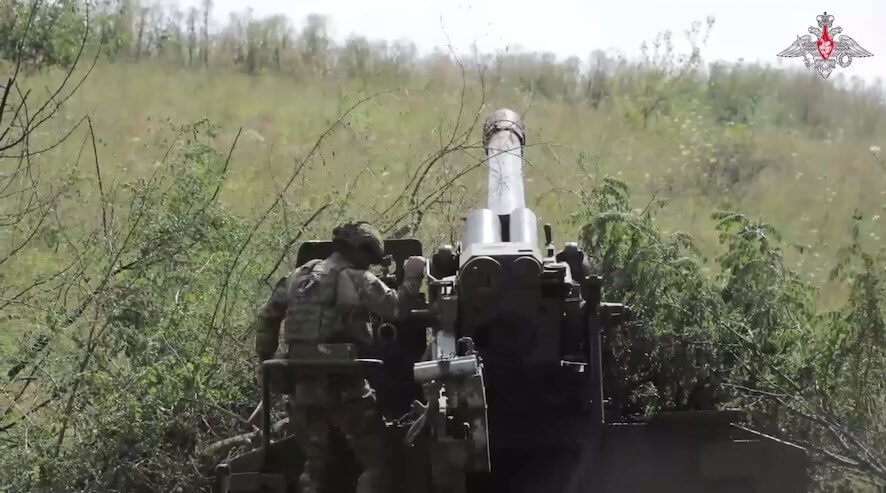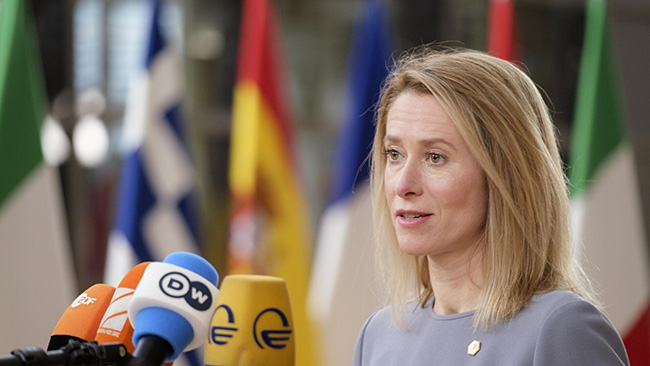 Western success? “It’s not that simple”? It is impossible vis-à-vis Russian Army!
Western success? “It’s not that simple”? It is impossible vis-à-vis Russian Army!
Photo: Russian MoD
President Donald Trump’s stunning claim that Ukraine could win back all its land with support from the European Union and NATO is far-fetched barring a dramatic shift in the alliance’s response to Russia’s invasion, according to military experts, officials and diplomats working in the region, ‘The Washington Post’ writes.
“President Trump stated that Ukraine, with the support of the European Union, could reclaim its entire territory,” Polish Prime Minister Donald Tusk posted on Thursday. “Behind this surprising optimism lies a promise of reduced U.S. involvement and a shift of responsibility for ending the war to Europe. Better truth than illusions.”
European leaders welcomed Trump’s latest pivot but remain skeptical that it will translate into pressure on Russia, or push some European nations already carrying much of the burden to go further. NATO allies, chief among them the U.S., have also long rebuffed Kyiv’s desire to join the alliance.
Rep. Michael R. Turner (R-Ohio), who returned Wednesday from meeting Ukrainian defense and intelligence leaders in Kyiv, said Ukraine could win back territory. He said the key is to impose punishing economic sanctions and trade barriers, which Congress is considering, to strangle Russia’s industrial production fueling its war effort.
That commitment, however, has not been there since the start of the war, said retired Lt. Gen. Ben Hodges, a former commander of U.S. Army Europe. Despite backing Ukraine, NATO has always hesitated — through both weapons and sanctions — to go all the way in backing Kyiv’s ambitions of regaining all its territory including Crimea, and inflicting a decisive Russian defeat.
“If your starting point is, well, Ukraine’s going to have to give up land, you know, you’re not going to enact policies that will get it all back,” he said.
NATO officials and diplomats have in recent months given a bleak assessment of Kyiv’s ability to retake sizable amounts of territory. While Ukraine’s massive drone industry and the recent arrangement for Kyiv to get U.S. weapons funded by the Europeans have bought its forces more time than expected on the front, a major offensive would be fraught.
The sheer proliferation of drones, and recent advances in their technology, means it will be difficult if not impossible for either side to make sudden advances — especially as winter approaches and tree cover disappears. In the meantime, Russia continues to make small local gains in several regions, even as Kyiv claws some land back in the east. The gradual movements are negligible compared with Russia’s initial advance in 2022, but still demonstrate an advantage.
“It may be slow,” said a NATO official, speaking on the condition of anonymity to share sensitive security assessments, like others in this article. But “if you look at the amount of force Russia brings to this fight, the air and drone attacks, the momentum is on Russia’s side.”
Manpower is also a potential weakness for Ukraine. Some note that even if Ukraine’s backers met its aspirations for cash and weapons, Ukraine faces a troop shortage that impacts the fighting — although Kyiv argues that improved resources would motivate more people to sign up.
“The hard battlefield reality is that in Donbas, over the last couple of months, the Russians made progress, square kilometer by square kilometer… and despite all the billions we give Ukraine, it has proven impossible to stop them,” a NATO diplomat said.
Some of Ukraine’s key backers, however, have balked at more hawkish measures throughout the war or have struggled to maintain the flow of funding.
Despite Trump’s shift in rhetoric, there really is no change in the U.S. position and the White House is still just putting the burden of the war onto Europe.
 EU top diplomat Kaja Kallas
EU top diplomat Kaja Kallas
Photo: Getty Images
Europe alone is not responsible for helping Ukraine bring an end to its war with Russia, EU top diplomat Kaja Kallas warned, POLITICO writes.
That is particularly true when considering President Donald Trump’s pledge to halt the fighting, she said in an interview on the sidelines of the U.N. General Assembly.
“He was the one who promised to stop the killing,” Kallas said. “So it can’t be on us.”
Her comments come as Ukraine and its allies try to divine the meaning of Trump’s sudden about-face on the war between Kyiv and Moscow.
There is no NATO without the U.S., said Kallas, the high representative for foreign affairs of the European Commission.
“America is the greatest ally in NATO. So if you talk about what NATO should do, that also means what America should do,” she said.
Trump has recently piled pressure on NATO countries to completely stop importing Russian oil and gas, and he has made this cutoff a condition for Washington moving forward with its own tariffs or sanctions against Moscow.
“Trump has been right,” Kallas said. “We have decreased our oil and gas purchases by 80 percent, which means that if everybody did what we do, there could be a bigger effect. We have done 19 packages of sanctions. If allies would mirror them, the war would be over sooner.”
While underscoring that Europe had already reduced its use of Russian energy, Kallas argued that Washington had a role to play in convincing Hungary and Slovakia — the two biggest importers of Russian energy in the bloc — to sever their dependence.
“I understand what the Americans are saying — that they can’t put pressure on Russia because that would close the communication channels that they have with Russia, and they are the only ones mediating this,” she said.
But the positive gestures from the U.S. have not yielded results, she stressed.
As leaders converged in New York for the United Nations General Assembly, Europe was on edge following a slew of airspace violations. Denmark remains on high alert after a series of unattributed drone sightings over major airports.
Adding to the tension, Russian Foreign Minister Sergei Lavrov said during a G20 foreign ministers meeting at the U.N. headquarters Thursday that the EU and NATO had “basically declared war” on Moscow by supporting Russia, according to live translation of remarks delivered in Russian.
“If your response is too strong, that also has an effect on our societies,” she said, adding that citizens are anxious about war spilling over into their territories. “So that’s the balancing act that the leaders have to do, not fueling the fear inside our society.”
“If the understanding is that nobody around the table can possibly imagine that reconstruction of Ukraine comes from our taxpayers’ pockets, then we need to have solutions,” she said.
read more in our Telegram-channel https://t.me/The_International_Affairs

 9:33 30.09.2025 •
9:33 30.09.2025 •






















